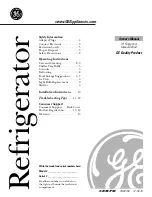
3
IMPORTANT SAFETY INFORMATION
Grounding type wall receptacle
Power cord with
3-prong grounded plug
Do not, under
any circumstances,
cut, remove,
or bypass the
grounding prong.
Electrical information
• The refrigerator must be plugged into its
own dedicated 115 Volt, 60 Hz., 15 Amp,
AC only electrical outlet. The power cord of
the appliance is equipped with a three-
prong grounding plug for your protection
against electrical shock hazards. It must be
plugged directly into a properly grounded
three prong receptacle. The receptacle
must be installed in accordance with local
codes and ordinances. Consult a qualified
electrician. Avoid connecting refrigerator to
a Ground Fault Interrupter (GFI) circuit. Do
not use an extension cord or adapter plug.
• If the power cord is damaged, it should
be replaced by an authorized service
technician to prevent any risk.
• Never unplug the refrigerator by pulling
on the power cord. Always grip the
plug firmly, and pull straight out from
the receptacle to prevent damaging the
power cord.
• Unplug the refrigerator before cleaning
and before replacing a light bulb to avoid
electrical shock.
•
Performance may be affected if the voltage
varies by 10% or more. Operating the
refrigerator with insufficient power can
damage the compressor. Such damage is
not covered under your warranty.
• Do not plug the unit into an electrical
outlet controlled by a wall switch or pull
cord to prevent the refrigerator from
being turned off accidentally.
WARNING
These guidelines must be followed to ensure
that safety mechanisms in this refrigerator
will operate properly.
IMPORTANT
Turning the Refrigerator controls to “0” will
disable your refrigerator’s cooling system,
but does not disconnect the power to the
light bulb and other electrical components.
To turn off power to your refrigerator you
must unplug the power cord from the elec-
trical outlet.
Proper Disposal of Refrigerators/Freezers
We strongly encourage responsible appliance
recycling/disposal methods. Check with your utility
company or visit www.energystar.gov/recycle for
more information on recycling your old refrigerator.
Before you throw
away your old
refrigerator/
freezer:
• Remove doors.
• Leave shelves in
place so children
may not easily
climb inside.
• Have refrigerant
removed by a
qualified service technician.
IMPORTANT
CFC/HCFC Disposal
Your old refrigerator may have a cooling
system that used CFCs or HCFCs (chlorofluo
-
rocarbons or hydrochlorofluorocarbons). CFCs
and HCFCs are believed to harm stratospheric
ozone if released to the atmosphere. Other
refrigerants may also cause harm to the envi-
ronment if released to the atmosphere.
If you are throwing away your old refrigera-
tor, make sure the refrigerant is removed for
proper disposal by a qualified technician. If
you intentionally release refrigerant, you may
be subject to fines and imprisonment under
provisions of environmental legislation.




































